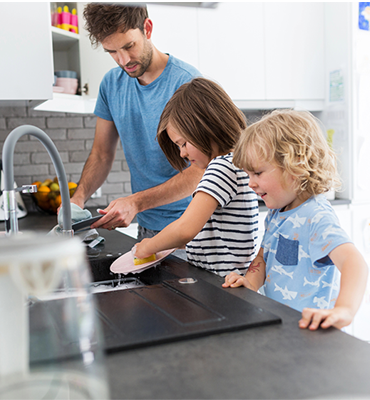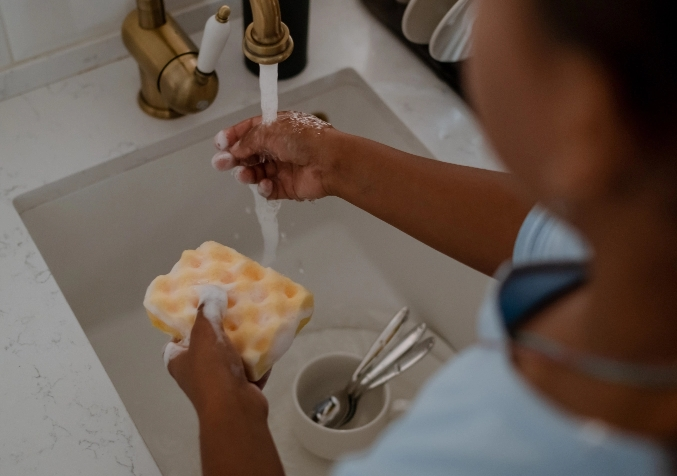Tips for Assigning Cleaning Duties to Children - A Guide for Parents
Published on Feb 16, 2023 | Updated - Aug 22, 2024

Here’s a teachable moment.
Your kids are much more capable than you think they are when it comes to helping around the home.
This guide will get them started on their housework journey!
Why is cleaning up important for kids?

When considering delegating household chores to your children, your initial motivation is probably minimising your own workload.
While that’s certainly a bonus, getting your kids involved in household tasks has myriad benefits for their development and wellbeing.
- Teaching cleaning skills as kids grow will help for the teenage years ahead, who are known for their messiness.
- Taking part in the running of a household builds a sense of belonging.
- Assigning jobs to teenagers teaches them important life skills that they’re going to need when they (eventually) move out. Knowing how to cook, clean and look after pets or siblings will have them prepared for ‘adult’ life.
- Despite their protests, children appreciate structure in their life.
Dr. Tamar Chansky, psychologist and author of several books including “Freeing Your Child from Anxiety” points to a study published by the University of Minnesota, which found that giving children household chores at an early age “helps to build a lasting sense of mastery, responsibility and self-reliance.” The study, which followed over 80 children throughout their life, found that kids who started doing chores early (at about age 3 or 4) were more likely to have good relationships with friends and family, as well as academic success and eventually success in their careers when compared with those who didn’t have chores as young kids.
1. Age-Appropriate Household Chores for Children

When assigning jobs around the home, you need to factor in age for capabilities and safety reasons.
It’s important to be realistic, particularly with younger children and if the family is new to the concept.
Start small and be patient.
Even little ones can learn how to help with simple tasks that help to instill a sense of responsibility and pride. Older children benefit from routine and expectations to help the home run smoothly as well.
2. Communicate why cleaning is important on a strictly hygienic level

Britta Gidican, a corporate communications professional in Seattle, found that helping her child connect the dots on how a messy home can lead to bigger problems got him interested in cleaning.
“I explain to [my six-year-old son] how germs travel, bugs lay webs/nests in messes, etc.” Gidican says, noting that she started doing this when he was around three years old. “That has seemed to do the trick in illustrating the ‘why’ behind our need to clean so he now understands and even goes further to explain it to others. [If] he sees someone leave dirty clothes on the floor or not clean up their dishes he will lecture them about how it's messy and needs to be tidy.”
3. Give them options
Part of what can make chores feel punishing is when you have no say in what they are or how you’ll deal with them. So give young kids some choice in the process.
“You can let your child choose their preferred chore within the parameters you set: you can do blocks or clothes — which would you like?” says Chansky. “Your child can also choose the thing they like to do: shredding mail, watering plants, setting the table — they will get a sense of ownership for their ‘domain’.”
4. Keep it small and realistic (this is helpful for adults, too!)
Choose household chores that suit children’s ages and abilities.
You can motivate children to do chores by praising and encouraging their efforts.
Young children can do chores like tidying up toys. Older children can help with setting the table, cleaning, cooking and so on.
Household Chores for Pre-Schoolers

Preschoolers are eager helpers and it’s hard to figure out just how to best harness their enthusiasm while giving them tasks that are actually useful. Depending upon the age and maturity of your child, there is a large variety of tasks that can be expected and accomplished by this age group.
With this age group, modeling is especially important. For example, show them just how to dampen a washcloth and wring it out to wipe their face and hands or how to set the table appropriately with plates in the center and silverware on the left or right side. It will take multiple times for them to have it up to your expectations, so have patience as they learn the proper technique.
While not every child or age can be expected to complete every task in the list below, pick ones that fit your child or children’s age and maturity as well as your needs.
General Household for Pre-Schoolers
- Wipe baseboards/cupboards with baby wipes.
- Help fold laundry – match socks, fold dishcloths and hand towels.
- Help sort laundry into whites and brights/darks
- Help put away clean clothes
- Clean windows with damp microfiber cloth
- Pick up toys, put books in bookshelf
- Help unload groceries
- Water plants
- Gather garbage
- Vacuum corners and edges along baseboards
- Wipe bathroom counter with dampened microfiber cloth
- Dust lower shelves and items
- Wipe doorknobs and switchplates.
Morning/Evening Chores for Pre-Schoolers
- Brush teeth
- Brush hair
- Bath/shower when needed
- Make bed- pull up comforter/duvet and put pillow at the top
- Put dirty clothes and pajamas in clothes basket
- Get dressed in the morning and pajamas in the evening
Morning/Evening Chores for Pre-Schoolers
- Brush teeth
- Brush hair
- Bath/shower when needed
- Make bed- pull up comforter/duvet and put pillow at the top
- Put dirty clothes and pajamas in clothes basket
- Get dressed in the morning and pajamas in the evening
Mealtime Chores for Pre-Schoolers
- Set table with plates, napkins and appropriate silverware
- Bring dirty dishes to sink when done eating
- Wipe down table
- Sweep up crumbs using a small dustpan and broom or handheld vacuum, premium microfiber cleaning cloths / multi-purpose cleaning & freshening powder
Types of Chores for Kids 9-12+ Years Old

General Household Chores for 9-12 Year Olds
- Help start and switch laundry loads
- Help fold laundry
- Help put away clean clothes
- Pick up toys and activities
- Help pack away groceries
- Water plants
- Take care of pets
- Take garbage and recycling to the curb
- Dust surfaces
- Sweep floors
- Clean clutter from bathroom counter
- Wipe bathroom counter with dampened microfiber cloth
Morning/Evening Chores for 9-12 Year Olds
- Brush teeth
- Brush hair
- Wipe face with a warm, wet washcloth after eating
- Bath/shower when needed
- Make bed—pull up comforter/duvet and flat sheet up and put pillow at the top
- Put dirty clothes and pajamas in clothes basket
- Get dressed in the morning and pajamas in the evening
Mealtime Chores for 9-12 Year Olds
- Simple mealtime prep help – eventual meal planning and cooking
- Help put away groceries
- Set table with plates, glasses, napkins and cutlery
- Bring dirty dishes to sink when done eating
- Put away leftovers
- Rinse dishes before loading in to dishwasher
- Dry and put away dishes
- Wipe down table
Daily Chores for Kids
Bedroom
- Make bed. I use a fitted sheet on the kids’ beds paired with a washable quilt or duvet. This makes it easier for kids to simply pull up the cover and put the pillow at the top.
- Help put away clean clothes as they are able. Start with putting away socks and move on to other items as kids get older. Put dirty clothes in laundry basket.
- Put toys away. We try to use the rule that before a new toy or activity is taken out, the unused one needs to be put away. We do several sweeps a day and check them before a special activity (screen time, snack time, friend time).
Bathroom
- Wipe down counter. A damp and wrung out microfiber cloth with water works perfectly for cleaning up little spatters and spills. No harsh cleaners necessary.
- Clean mirror. A barely damp microfiber cloth is great for this task. Refills empty toilet paper and tissue boxes. Collect garbage. Wipe down baseboards and around the perimeter of the bathroom with baby wipes.
Living Area
- Pick up toys
- Check under couch and furniture for errant toys and odds and ends.
Kitchen
- Wash dishes. Help unload the dishwasher. Younger children can help sort silverware and older children can put away breakables, dishes and glasses. Set the table. Clear plates at the table, bringing dishes to sink.
- Little ones can be taught how to use a small dustpan and broom to gather up crumbs and other little odds and ends as well as emptying it in to the garbage.
- A handheld vacuum cleaner also works well for children to help with vacuuming up crumbs, small scraps, and kitchen floor debris. Wipe the table down. Help empty trash and sort recyclables.
Laundry
- Help sort by color (whites, brights, and darks). Sort and pair up socks. Help make matches with pajamas and outfits. Put clothes on hangers.
- Collect garbage in the laundry room. I have a small trash basket in the laundry room for lint, tags, etc. that the kids take care of emptying when asked.
Pet Care
- Take care of water and food for pets. My oldest started this routine around 5 years old.
- ‘Help’ with brushing and bathing.
- Gather up pet toys at the end of the day to store in basket or container.
How To Motivate Children to Clean Up

Banish the concept of cleaning as punishment
How many times as a child was I sent to clean the yard or scrub the kitchen floor as a form of punishment? Too many times to count. My mother may have meant well (and it certainly got the job done at the time), but this method doesn’t bode well if you would like your child to actually want to clean.
The better message to send to kids is that cleaning “is not a punishment or a chore, it’s a ticket to other things being possible,” says Chansky. “If you are negative and talk about what kids ‘have to do’ in a grumpy manner, kids will be grumpy right back.”
Chores for Children of Different Ages

Here are some ideas for chores for children of different ages:
Toddlers (2-3 years)
Pick up toys and books. Put clothes on clothes hooks. Set placemats on the dinner table.
Preschoolers (4-5 years)
Set the table for meals. Help with preparing meals, under supervision. Help put clean clothes into piles for each family member, ready to fold. Help with grocery shopping and putting away groceries.
School-age children (6-11 years)
Water the garden and indoor plants. Feed pets. Help with hanging out clothes and folding washing. Take out rubbish. Help with choosing meals and shopping. Help with meal preparation and serving, under supervision. Vacuum or sweep floors.
Teenagers (12-18 years)
Teenagers can do the chores they did when they were younger, but they can be responsible for doing them on their own.
Teenagers can also take on more difficult chores. For example, teenagers could do the washing, clean the bathroom and toilet, prepare meals, stack the dishwasher or mow lawns.
When choosing chores for teenagers, think of the skills you’d like them to learn.